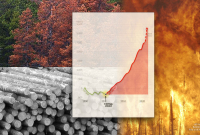Support strong Canadian climate journalism for 2025
Liberal cabinet ministers are suggesting the federal government is ready to tackle long-standing problems related to the international student program, including cases of fraud and exploitation by shady educational institutions.
But in a slight twist, they are doing so as part of efforts to ease the housing crisis as the government faces enormous pressure to help increase the supply of affordable homes.
The federal cabinet's three-day retreat in Charlottetown focused on housing as ministers hashed out their agenda for the fall sitting of Parliament.
International students became a focal point at the retreat when the Housing Minister Sean Fraser, who was recently shuffled from the immigration file, suggested ballooning foreign student enrolments are putting "unprecedented levels of demand" on the housing market.
Fraser said if colleges and universities are going to bring record numbers of foreign students to Canada, they need to play a part in housing them.
Public colleges and universities have come to rely on the income from international student fees. So, too, have private colleges that sprang up in strip malls and other venues. While they recruit attract foreign students, in some cases the institutions offer a dubious education in return.
Fraser suggested the government could begin to sort out which schools are offering a genuine education and which are looking to exploit vulnerable students.
"Separating the wheat from the chaff is going to be a big focus of the work that I try to do with (Immigration Minister Marc Miller) to identify a solution to this challenge," he said.
Another option: a cap on the number of student visas.
Several experts say they are concerned about the ripple effects of such policies.
There are things the government can do to decrease demand for student visas, said Alex Usher, president of the Higher Education Strategy Associates consulting firm.
"The government seems to be contemplating something much stupider," he said in an interview. "Much stupider and much more complicated."
Curbing the number of visas would leave the Immigration Department to determine which educational institutions should be trusted to receive coveted tuition, he said, which is far outside its jurisdiction.
"Quickly the discussion becomes, not 'How do we reduce pressure on housing?' It becomes 'How do we ration spots?' And so all sorts of other agendas start coming into play," he said, which would create financial winners and losers.
The Immigration Department counted 800,000 active study permits at the end of 2022, a 170 per cent increase over the last decade.
A 2020 report by the Higher Education Strategy Associates fount that international student tuition made up 13 per cent of the post-secondary system's income in 2019, up from just four per cent in 2007.
Mike Moffatt, senior policy director at the Smart Prosperity Institute, supports the idea of scaling back student visas but what's he's heard so far sounds "overly complex and doomed to fail."
Moffatt is one of two housing experts who was invited to the cabinet retreat to offer possible solutions to the pressing problem, and suggested the federal government more or less stay in its lane by tamping down demand for student visas.
For the last several years the federal government has been working to attract international students, last year launching a pilot project to remove the cap on the number of hours they are allowed to work off-campus.
Moffatt suggests reversing that trend by instituting stiffer financial criteria to apply for a visa, and rolling back some of the reforms that make those student permits more attractive.
In a statement, the Immigration Department said the government will need to have "difficult conversations" with provinces, who have sole jurisdiction over education, about threats to the integrity of the system and outline the "perverse incentives" created for institutions.
"Abuses in the system exist and must be tackled in smart and logical ways," the department said in the statement.
Several universities have already pushed back on the idea of a cap.
"The university, in discussions with (the Immigration Department), has been clear that we do not support a cap on international students," University of British Columbia spokesperson Matthew Ramsey said in a statement in response to the minister's comments.
UBC's Vancouver campus has an international student enrolment of 28.6 per cent.
The university said investments in student housing are a way to ease the demand for rentals, including its own plan to build 4,800 beds over the next 10 to 15 years.
NDP immigration critic Jenny Kwan said that's where her party would like to see the government focus, by sharing the cost to build affordable student housing.
Kwan said visas should be allocated to institutions that have a "credible and affordable" student housing plan.
She also asid that capping enrolments would amount to blaming the students — echoing comments earlier this week from Conservative Leader Pierre Poilievre.
Vancouver Immigration lawyer Will Tao said he's skeptical of Fraser's suggestion that student exploitation and housing are linked, and wants to see more data about international students and the housing market.
"I think they're trying to sort of get to two birds with one stone politically," Tao said.
"I think international students are kind of a scapegoat. It's the easiest thing to blame. It's the ones with the least pushback."
This report by The Canadian Press was first published Aug. 23, 2023.




Comments